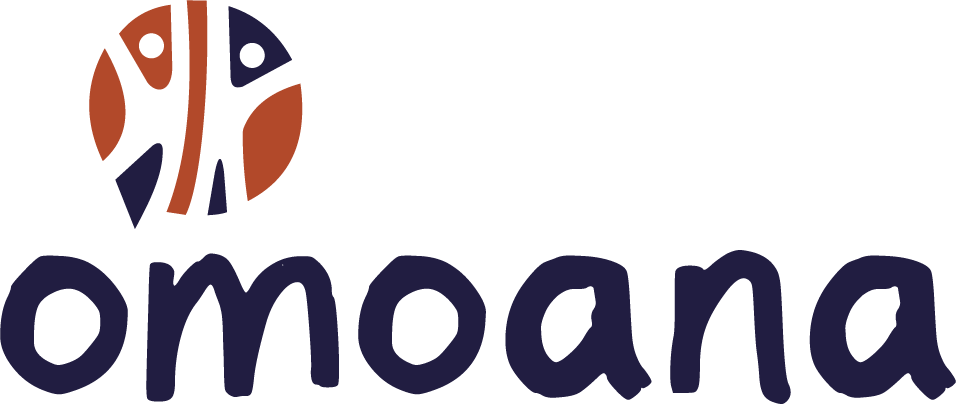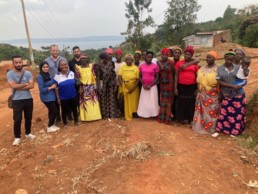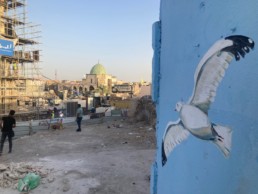2 weeks of exchange, 10 years of experience - News from Omoana - October 2024
Thanks to the Fédération Genevoise de Coopération’s Knowledge Sharing fund, three Iraqi colleagues were able to travel to Uganda, where they took part in workshops and visited projects. The exchanges, particularly on how to support children affected by violence, proved invaluable. Amjed Al-Rufaye gives us some feedback.
I’ve always been fascinated by the projects supported by Omoana in Uganda, but during my time there they continued to exceed my expectations.
My name is Amjed Al-Rufaye and I am originally from Baghdad, Iraq. In the past, I have worked for various NGOs in Iraq and Turkey. I am currently working as a technical advisor for Omoana and Aid Gate Organization in Iraq.
Our trip to Uganda began in Gulu with a four-day workshop bringing together teams from the NGOs currently supported by Omoana in Uganda. Along with other colleagues, we led visual art exercises for psychosocial support as part of the creation of the ‘Drawing Together’ manual. The workshop continued with Adrien and other drama coaches presenting drama exercises (for the ‘Theatre Together’ manual). It was a creative and interactive experience that filled the room with laughter. At the end, we listened to the feedback, discussed the importance of art, how it can benefit children and how it can be adapted to local projects and culture.
In the days that followed, we had meetings with Omoana’s NGO partners. We had a presentation of the teams behind the projects, exchanged questions and learned about each other’s experiences. After that, they took us out into the field and showed us how they interact with the local communities.
During these visits, I gained valuable information about the history and needs of the local community, and how Uganda and Iraq have gone through similar circumstances. For example, I loved what vivo is doing in Gulu to help victims overcome the trauma of being abducted by the Lord’s Resistance Army as children and the horrors they were forced to see or do. Hearing these experiences reminded me of the time of the Islamic State in Mosul and the stories I heard from the locals. It made me think about how we can adapt what vivo does to help young people in detention centres and the community. The same goes for St. Moses and Hashtag Gulu and the psychosocial support projects they run in the community, and how we can implement similar projects by supporting and revitalising community centres for neglected young people in Iraq. Omoana House and St. Francis and their support for people living with HIV have opened my eyes to a serious problem facing Iraq. The lack of awareness about HIV and the growing number of undisclosed cases in the community make it a potential time bomb.
We learned a lot about the processes of various development NGOs, the challenges they faced and how they overcame them. It provided me with information about Omoana, highlighted the importance of art and how it helped beneficiaries to express themselves when words were not enough. It also opened my eyes to new ideas and projects that can be adapted in Iraq. It was a very artistic experience filled with traditional dances and theatrical performances. In a fortnight in Uganda, we feel like we’ve gained ten years’ experience! We exchanged invaluable knowledge, immersed ourselves in a new culture and formed solid friendships, all the while escaping the 50°C temperatures in Baghdad.
Amjed Al-Rufaye
Technical Counsellor, Omoana
Breaking news : Omoana extends its activities to Iraq
Building a new narrative for peace with the youth of Mosul
Omoana strengthens the resources of young people as actors in the development and social cohesion of their country. Originally active in Uganda, with a wealth of experience working with young people formerly affiliated to the Lord’s Resistance Army (LRA), the organisation has developed expertise in psychosocial support through art and in mental health. As a result, it has decided to extend its activities to Iraq, a country where young people face similar dynamics of violence, with many children and young people associated with armed groups, having serious consequences for their well-being.
Developing social skills and preventing violence among young people
A long history of violence
With almost a quarter of the Iraqi population aged between 15 and 24, young people are the backbone of the country’s social, economic and political transformation. However, they are disproportionately affected by conflict. After the Islamic State (EI) occupied much of its territory, much remains to be rebuilt. Iraqi children and young people have been greatly affected by the crisis. They have suffered and sometimes committed high levels of violence. Despite the environment in which they lived and the groups they joined, they must be given the opportunity to build a new narrative for peace.
Years of conflict between Iraqi security forces and the EI have devastated the north of the country. According to the United Nations Office for the Coordination of Humanitarian Affairs (UNOCHA), nearly 664,000 children are at risk of protection. Of these children, 122,000 are living in critical shelters with limited access to essential services. The lack of livelihood opportunities for their families and the COVID-19 epidemic have had a negative impact on their income-generating potential. As a result, children continue to be exposed to the risks of child labour and early marriage. Around 456,000 children still lack basic civil status documents and almost 300,000 school-age children do not regularly attend formal or informal education, putting them at increased risk of recruitment by armed groups in the areas where they operate. More than 1,000 children remain deprived of their liberty for national security reasons. Children from families previously associated with armed groups, or perceived to be so, are discriminated against and face difficulties integrating into their communities.
The protection issues mentioned above are factors that encourage young people to return to armed groups. Be that as it may, the social integration of young people at risk of recruitment by violent extremist groups remains a key and complex issue that needs to be addressed.
Art for peace and protection for the children of Mosul
Omoana’s first partner in the country will be Aid Gate Organization (AGO). Aid Gate Organization (AGO) is an independent, non-partisan national organisation with a history dating back to 2014 with the start of the occupation of much of Iraq by The Islamic State (EI). AGO works tirelessly to help internally displaced people, refugees, asylum seekers, returnees and vulnerable host communities in Iraq. The aim of the new project, implemented with technical and financial support from Omoana, will be to build the capacity, resilience and talents of children and young people affected by conflict through arts-based initiatives and protection services. It will target children and young people in detention, as well as those in at-risk communities. The approach aims to work at different levels to support the reintegration of children formerly affiliated to armed groups and to promote the well-being of young people in communities. At an individual level, children in conflict with the law will be monitored to ensure they have access to legal services and professional education and training. Low-intensity psychological support will also be available. Their families will also be supported and advised on the best ways to care for a child or young person after detention. Children and young people in detention and in the communities will receive peace education sessions to strengthen their social skills and critical thinking and prevent violence. They will also benefit from artistic activities to develop their talents and personal confidence. Young people in the communities will also be encouraged to organise their own community events on peace-building themes. Tools such as forum theatre and the creation of murals will be used. Social workers from AGO and the public services will also receive training in peace education for young people and in low-intensity psychological services.
Preserving the dignity of children affiliated to armed groups is no easy task. It requires commitment, networking and technical skills. We are striving to work with national and international experts to respond to these challenges as effectively as possible and to try to give them sympathetic attention, despite the violence of which they are above all victims.




